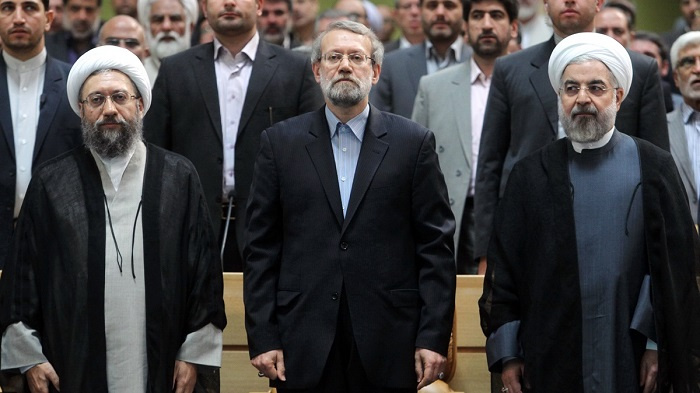Tied by Blood, Bound by Law

(From left: Sadegh Larijani, Ali Larijani, and Hassan Rouhani during a judicial summit in Tehran.)
The last two weeks have not been the most pleasant for Chief Magistrate Sadegh Larijani. First came a rumor about judiciary’s assets, making the rounds on social media in Iran. An original report on Amad News, a sensational Telegram® channel disclosing (uncorroborated) news leaks on political and fiscal corruption inside the establishment, which accused the judiciary chief of having deposited the judiciary’s assets in some 63 personal bank accounts with an overall annual interest of about 25 billion tomans (almost $6.7 m). The report claimed that the Supreme Leader was refusing to meet Ayatollah Larijani over the revelations, quoting unnamed officials that the Supreme Leader was seriously considering a replacement.
Following the rumors came a series of tweets by Tehran’s outspoken parliamentarian the Reformist Mahmoud Sadeghi, insisting that the chief magistrate provided clarification on the issue. After early rejections of the news, on November 9th, Finance Minister Ali Tayebnia told Iranian state TV that those deposits had been a routine during the previous 20 years following an agreement between the Central Bank and the country’s treasury. “Certain sums have been deposited in the country’s banking system in compliance with the law and jurisprudential guidelines,” he said. The interests he said had been spent on certain judiciary expenditures.
That did not convince MP Mahmoud Sadeghi who then submitted a parliamentary enquiry, asking Finance Minister Ali Tayebnia to provide elaboration on the legal basis of the judiciary’s deposit accounts, the number, owners, and interests of the accounts as well as where they were being spent.
In the meantime, the abrupt cancellation of a speech on the day of Arbaeen, to be made by Vice Parliament Speaker Ali Motahari, in Mashhad, center of Razavi Khorasan Province in northeaster Iran, soon turned into a heated controversy as advocates of reform and freedom of expression accused local officials of arbitrary decision-making and practicing autonomous rule in the country’s second largest city. This came after months of debates over holding concerts in the city had ultimately led to the victory hardliner local officials, including Friday Prayers leader Ahmad Alamolhoda who wanted no musical fête in the city, viewing it as blasphemous to Imam Reza (AS), Eighth Shia Imam who is buried in the city.
After the recent cancelation of his speech, apparently upon an order by Mashhad attorney general, Motahari immediately wrote to President Rouhani requiring a final word on who and what rules the city, calling the episode a “Daeshite” incident. In response, Rouhani called the incident an embarrassment, ordering interior and justice ministers to thoroughly investigate, quickly report, detect and inform the identity of the offenders. Rouhani added that he “expected” the judiciary to protect freedom of speech, enshrined in the constitution, and “hoped” the judiciary head Sadegh Larijani followed the case promptly.
Other lawmakers, mostly pro-reform, joined the outcry and promised investigation. Majlis is now sending three representatives to Mashhad to visit local officials and submit a report. Parliament Speaker Ali Larijani, brother of Chief Magistrate Sadegh Larijani, also branded the cancellation “regrettable”. Even if there was intelligence anticipating a security issue during the speech, he said, the solution was to bring it up in the local security council and seek collective decision. He also revealed that he had conferred with the judiciary chief a day before the speech was planned and that they agreed on the local security council solution. “For now, I do not want to make a final decision because I have not heard the attorney’s explanations,” he said.
This came to be the last proof for judiciary chief Ayatollah Amoli Larijani that the confrontation at work is of a partisan nature. Addressing “slanders” against the judicial apparatus, Larijani denied having deposited public money in personal accounts, saying it was easy to prove the claim wrong as evidence was available. He went on to lambast the president for his lack of patience before passing a judgment on Mashhad incident. “You said you do this to protect the basic rights of people. Doesn’t that apply to the judiciary chief [as a citizen]?” he complained. Sadegh Larijani also explicitly referred to his brother and Parliament Speaker Ali Larijani for remaining silent when a parliamentarian, that is, Mahmoud Sadeghi, brought up the accusations. “Of course, I do not need your defense,” he said, addressing Rouhani and his brother, Ali.
Repercussions of verbal fight are coming one after another. Tehran MP Mahmoud Sadeghi has taken to Twitter to respond to Sadegh Larijani’s criticisms. In the meantime, a number of Principlist figures are scolding Ali Motahari for adding fuel to the fire. Rouhani and Chief Magistrate Sadegh Larijani have had other confrontations before, most recently on press freedom, and are expected to disagree on many issues in the remaining of their terms. The unexpected part of the row, however, is the extraordinarily sharp language Sadegh Amoli Larijani used to strike his own brother Ali. For the foreseeable future, it seems that Ali Larijani should try to find the golden mean between his brother and Ali Motahari, his brother-in-law.

